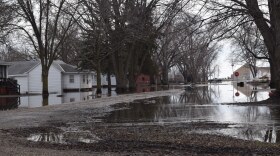It’s been nearly a month since the swollen Missouri River and its tributaries started to flood western Iowa. In southwest Iowa’s Fremont County, hundreds of homes remain evacuated, with no word of when people can go back.
Flooding has kept Matt Schoville and his family away from their home just outside of Percival for about a month, but they’ve decided to grab some of their things and assess the damage.
Matt broke out some of the walls in his home with a hammer, to pull out insulation. He said he doesn't want mold to grow where the floodwaters touched.
“We have to stop the mold from growing up the walls,” Matt Schoville said. “And what it will do is it will soften it all the way here and then the insulation behind the wall will get wet and mold and then we’ll have a lot more issues than what we already have.”
Just two weeks ago, the Schovilles’ home was flooded with about 3 feet of water and Matt was sure they had lost it. Now, he says they are going to do everything they can to save it.
"It's just devastating." -Jacie Schoville
They bought the house in December 2017 and spent close to a year gutting and remodeling it. Matt and his wife, Andrea, plan to retire there.
But right now there is mud and debris in every room of their ground floor.
“I don’t even know how to, I’ve been numb since the day it happened, because I really don’t, I don’t know,” Matt Schoville said. “We went from having three homes in January to having nothing, basically.”
“It’s, I don’t know, it’s finally just kicking in that you’re just like, 'it’s gone.' You know, the stuff you work so hard for,” Andrea Schoville said.
Clothes left in the dryer were soaked from the flood. Their 16-year-old daughter Jacie’s truck is ruined. She said it’s hard looking at everything washed away.
“It’s just devastating,” Jacie Schoville said. “I mean, it took us so long to get to where we were and there’s so much work, a lot of hard work put into the house, and just to see it all washed away, it’s crazy.”
To get to their home, the Schovilles had to take a small rickety airboat that holds about 350 pounds. On the way home, with the weight of four of them and a reporter, several backpacks and even a trumpet case, the boat was well over capacity as the family navigated through the floodwaters. At one point, the boat got stuck.
“Pull off of that tree! Push off of it! It will help,” Matt Schoville yelled over the noise of the boat.
“Where’s the oar?!” Jacie Schoville yelled back.
As the sun set, the Schovilles were running out of time to get to shore. Floodwaters seeped into the boat. Everyone's clothes got a little wet and their legs were muddy.
“Oh my gosh, this is so scary,” Jacie Schoville said.
Ultimately, they made it back to safety.
"We're trying to keep from losing people." -Mike Crecelius, Fremont County Emergency Management Coordinator
Fremont County Emergency Management Coordinator Mike Crecelius said he can understand why people want to see their homes, but it's just not safe to do that yet.
“This is a small county. We’re not a rich county,” Crecelius said. “And we are not equipped to do a swift water rescue out there.”
One person died last month from hypothermia after driving around a barricade and getting stuck in ice cold floodwaters.
“We’re trying to keep from losing people,” Crecelius said.

Evacuation orders and road closures are still in place in the western portion of Fremont County. Crecelius said he’s had enough of people risking their lives.
“So please, if you come down here and there’s a sign that says ‘road closed ahead’, turn around, it’s there for a reason,” Crecelius said.
The Schoville family has been staying in a camper at a state park while they remain evacuated. They plan to move their camper to their yard as soon as the order is lifted. They’ll live in tight quarters as they work on the house.
But Crecelius said it could be months before it’s safe for some people to go back home.
“We’ve got to get rid of water and we’ve got to get some roads fixed before we can, with a clear conscience, allow people to go back out there,” Crecelius said.
That means for now, the Schovilles and hundreds of others are adjusting to a new way of life.










